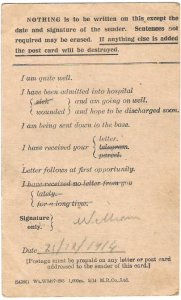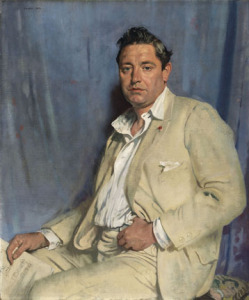First letter since Belfast to be written in ink. Envelope addressed to Miss M. Crawshaw, 29 etc (1st since October to Miss M) franked 23.01.15
Dated 23.01.15
Dear Till
Many thanks for your welcome and interesting letter which I received yesterday. Pleased to hear that you received the Gift alright. Bert told me that his brother was getting on alright when he sent parcel, but have answered his letter but have had no reply yet. Have just heard from Dolly, she mentioned that she enjoyed herself along of you. Doll as got a far better place at last, which is what she deserves, what say you?
Yes I think that it is best what you say about my clothes. I haven’t worn the socks yet but will let you know when I next write.
So you are getting on alright at Stewarts, still merry and bright and doing all the work. Tell Aunt she is a long time writing that budget, tell her to buck up.
No I have not heard from Tom yet but I expect I shall hear from him when he has time to write, I expect he is busy at sea just at present, has Aunt or Mattie had a line from him yet? How are they all at home -still merry and bright – and also old uncle I expect he still wishes he was young enough to go back to sea, give old Tango my best regards. I expect Wallie as started work by now.
Well Till I am getting on as well as can be expected still merry and bright and also in the pink. The weather out here is just about the same, raining from Monday until Saturday night and a few showers on Sunday for a change so you can guess what it is like. But still the Bhoys make the best of it.
Oh Till I have just received Aunt’s letter and was sorry to hear that Tom as met with a nasty accident while at sea but I hope that he will soon pull through. So Mattie is layed up then, let’s hope he will soon be on the old knocker again. And I have just received a parcel from Dolly, a scarf and a piece of Xmas cake, which I think is very good of her, what say you? Heard from Fred Hale yesterday, he wrote a very nice letter.
At present we are having a few days rest which we are all pleased to get, so don’t get having a fit because this is wrote in ink. Remember me to Doris when you next write.
Well Till I don’t think there is any more news at present, except that things are just about the same out here, still J Johnsons flying about and Mr Sniper just as busy as usual. Now I think this is all the news at present, trusting you are all in the best of health at home, and I hope to hear from you soon.
I remain,
Your loving Brother
Frank
xxxxxPS. Tell Bert I have not heard from him yet, did he get my letter ask him.
23rd January 1915
This post got a bit delayed, so apologies. The Dorsets remained in billets for another day, while the COs of the 15th Brigade’s battalions got together to plan their inevitable return to the trenches.
Frank has written another letter back to Mabel. The first, Geoff notes, in pen since he left Belfast. I’d like to think that Frank got the opportunity to sit at a table in a café in Bailleul to write this. But somehow I know that’s probably fantasy. He warns Mabel at the end of the letter “don’t go having a fit”. Presumably he think she might believe him to be writing from hospital. If only he had received a “Blighty“.
The Princess Mary Christmas Fund Gift Box is mentioned once more, now abbreviated to the “The Gift“. Frank’s also received another parcel from my Great Grandfather, Carl Robert Debnam. There’s a reference to his brother. I’ve read these letters many times but today is the first time I’ve noticed this. In my records Carl Robert Debnam doesn’t have a brother. Is this a slip of the pen by Frank? If his brother is also on active service, as the “was getting on alright” implies, then is this another hidden part of the family obscured by war?
The 1911 census has a bit more information than other census records, in that it lists the number of children born to the mother, alive or dead. Carl’s mother, the luxuriously named Justina Charlotta, only has one child listed and she’s 49 by this time. Robert Debnam had married her at the age of 26. Did either of them have a previous marriage I am unaware of? It’s a mystery I will return to.
The other, as yet, unidentified relatives, Old Uncle and Auntie Tango and Tom are mentioned, along with the fact that Old Uncle used to be in the navy. Tom is now in the Navy. Did he follow his family up the gangplank? Fnarr, fnarr. I’ve been looking at the Webster side of the family tree up till now, but perhaps my attention is better turned to Caroline’s parents, Charles and Emma Davis.
Emma Davis was born in Woolwich Dock Yard in 1846, so we have a naval connection straight away. Woolwich dockyard was incredibly important to the British Navy from the sixteenth century to the late eighteenth century but was becoming increasingly irrelevant to ship building as boats got larger and the Thames silted up. The Royal Arsenal began to dominate the area from the mid-Nineteenth century onwards.
The couple had three children, as far I as I can find out at the moment: Caroline, Frederick and Rose. The dates of their birth (1878, 1879, 1883 respectively) make it difficult for them to have had a child old enough to be on active service. Caroline would have had to have been 17 or 18 to have a child at that time. Frederick and Rose are still both living at home in 1901 so it’s very unlikely that they had children. Could I have missed another older sibling perhaps? Or did Caroline have a another child we don’t know about.
Frank must have stopped the letter at some point because the tone changes half way through. He’s had a letter from Aunt Caroline telling him that Tom has “met with a nasty accident while at sea”. Without a surname to give to Tom, it is going to be nigh on impossible to find out the name of the ship or submarine he was on. All we know that he was on a ship that gave him plenty of leave to get back to London so can we assume that it was patrolling the waters around Great Britain? I fear that this slender connection to Tom, just a few mentions in letters from 100 hundred years ago, may now be lost in time.
Has this event triggered Uncle Mattie’s illness? We already know that Uncle Matt is a bit of a sick note. Let’s hope he’s on the knocker again soon.
Frank has also had a letter from someone called Fred Hale and we can assume that Fred is well known to both Frank and Mabel. If this is one of their childhood friends then the only Londoner called Frederick Hale listed in the 1911 census was born in Lambeth in 1889 and now lives in Camberwell. He’s a kitchen porter at some “refreshment rooms”. Could these “refreshment rooms” have been Stewarts?

